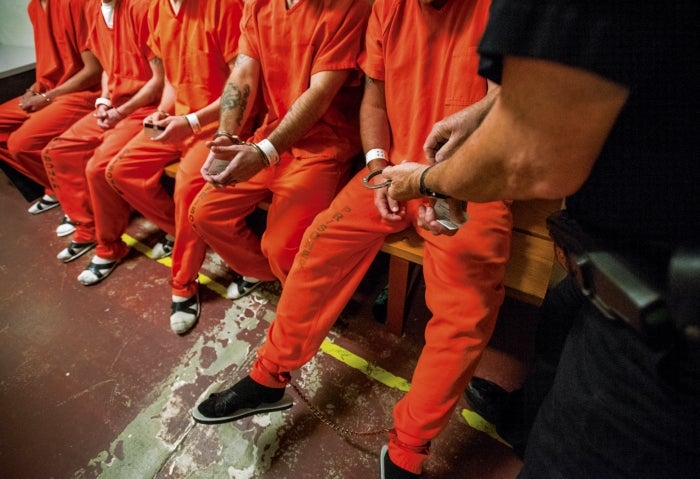John Hood: Bail not supposed to serve as punishment
Published 12:00 am Wednesday, May 1, 2019

- ALLISON LEE ISLEY/SALISBURY POST Deputy J. Barnwell removes an inmates hand-cuffs after attending court at the Rowan County Detention Center in Salisbury on Friday, April 29, 2016.
By John Hood
RALEIGH — If you are convicted of a crime, the government can punish you. If you are arrested but never convicted, the government can’t punish you.
That’s the principle, anyway.
Governments sometimes seize and sell the assets of suspects, even before they are never convicted. And defendants are sometimes charged such high bail that they can’t afford to get out of jail prior to their trials. Even if subsequently found not guilty, they have, in effect, been punished. Moreover, some who can’t make bail will plead guilty to offenses just to get out of jail, potentially subverting the pursuit of justice.
Paying bail for pretrial release isn’t like paying a fine for violating the law. Its primary purpose is to lower the risk that defendants won’t show up for their trials. Both the U.S. Constitution and North Carolina’s Constitution prohibit “excessive bail.” If our judicial system requires bail from garden-variety defendants who would have shown up for trial anyway, then any bail amount for them is “excessive.”
Defenders of how North Carolina and other states currently use bail would argue that assessing such risks is a complex and challenging task — and they’d be right. There are certainly many defendants in our jails right now who deserve to be there. We should want them there. They have contempt for the rule of law. They’d skip out if released. And they are dangerous. It is both just and cost-effective to make it extremely costly if not impossible for those individuals to obtain pretrial release.
But when it comes to distinguishing them from others who don’t present such risks, bail lacks precision. It imposes costs on some of the wrong people and fails adequately to restrain some of the right people.
Consider what happened when Mecklenburg County modified its approach in 2014 and adopted a pretrial risk-assessment tool to improve judicial decisions. As a result, some offenders who would otherwise have been jailed at taxpayer expense because they couldn’t make bail were instead released to await trial or sent into less-costly pretrial programs.
Over the next three years, the number of people in Mecklenburg jails dropped by 11 percent, even as the county’s population continued to rise.
That’s no surprise, but here’s the key point: the decline in the jail population didn’t result in a higher share of no-shows at trial or rearrests for other crimes.
That suggests that before Mecklenburg began using its risk-assessment tool, it was resorting to bail and jail more than necessary.
“The preliminary results of Mecklenburg’s experiment demonstrate that bail reform can decrease the pretrial jail population while avoiding significant increases in crime or skipped court dates,” observed Emily Mooney and Arthur Rizer, who analyze criminal-justice issues for the R Street Institute in Washington.
North Carolina should seek to replicate Mecklenburg’s experience in other counties and experiment with other reforms. That was one of the recommendations of the North Carolina Commission on the Administration of Law and Justice, of which I was a member. I’m far from an expert on this topic, but I think state and local policymakers need a clear focus on pretrial justice. The cost of excessive bail isn’t confined to those accused of crimes. It is socialized.
Taxpayers pay for overcrowded jails and overworked officers. Some defendants stuck in jail lose jobs, lose connections with family, and end up more likely to commit subsequent crimes than if their cases had been handled differently.
Again, I’m not making a blanket statement.
High bail amounts and time in jail before trial are clearly appropriate in some cases. When defendants don’t show up for trial, or victimize others after being released from jail, that imposes social costs, too. But the balance seems off. Time to get it right.
John Hood is chairman of the John Locke Foundation.

